First Woman to Run for President of the United States
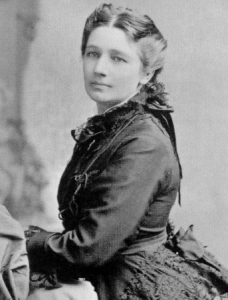 Victoria Woodhull (1838– June 9, 1927) was a leader of the women’s suffrage movement. She was the first woman to own a brokerage firm on Wall Street, the first woman to start a weekly newspaper, and an activist for women’s rights and labor reform. At her peak of political activity in the early 1870s, Woodhull is best known as the first woman candidate for the United States presidency, which she ran for in 1872 for the Equal Rights Party, supporting women’s suffrage and equal rights.
Victoria Woodhull (1838– June 9, 1927) was a leader of the women’s suffrage movement. She was the first woman to own a brokerage firm on Wall Street, the first woman to start a weekly newspaper, and an activist for women’s rights and labor reform. At her peak of political activity in the early 1870s, Woodhull is best known as the first woman candidate for the United States presidency, which she ran for in 1872 for the Equal Rights Party, supporting women’s suffrage and equal rights.
Childhood and Early Years
Victoria California Claflin was born September 23, 1838, the seventh of ten children, in the rural frontier town of Homer, Ohio. Her father Reuben Buckman Claflin was a con man who came from an impoverished branch of the Massachusetts-based Scots-American Claflin family. Victoria was very close to her sister Tennessee Celeste Claflin (called Tennie), seven years her junior and the last child born to the family.
From an early age, Victoria’s supposed spiritual clairvoyance and fortune-telling abilities proved a valuable source of income for her poor family. She was forced to leave school and the town of Homer with her family after her father burned the family’s rotting gristmill. When he tried to collect on his insurance policy, his arson and fraud were discovered.
From childhood, Victoria maintained that she was guided and protected by the spirits, who occasionally let her visit a utopian world in heaven unlike the chaotic, miserable world in which she lived. Victoria spent most of her youth traveling with her family’s medicine show, telling fortunes and selling patent medicines.
Marriage and Family
In 1853, at age 15, in order to escape her father’s brutality Victoria eloped with Canning Woodhull, a patent medicine salesman who also claimed to be a doctor. Licensing requirements for physicians at that time were non-existent or loose. Victoria soon learned that her new husband was an alcoholic and a womanizer, and she often had to work outside the home to support the family. They had two children: Byron, who was retarded, and Zulu (or Zula) Maude, whose delivery was so badly botched by her father that she almost bled to death.
In 1860, the Woodhulls moved to New York City, where the Claflin family were already living. Victoria and her sister Tennessee (Tennie) set up practice as mediums. In 1864, in search of new clients, the Woodhulls and Tennie moved to Cincinnati, then Chicago, traveling to keep ahead of complaints and legal proceedings. In Ohio, Tennie was charged with manslaughter when her “treatments” failed to cure a patient with breast cancer.
Victoria grew more intolerant of Canning’s drinking and womanizing, and of his occasional beatings, and he became less and less connected to his family. Soon Canning essentially deserted Victoria and the children, coming home only for money. After 11 years of marriage, Victoria divorced Canning in 1864.
Likely during her troubled first marriage, Victoria Woodhull became an advocate of free love: the idea that a person has the right to stay with a person only so long as they choose, and that they can commit to another (monogamous) relationship when they decide to move on. Women in the 19th century had few options to escape a bad marriage. Divorce was considered scandalous, and women who divorced were often ostracized by society.
Woodhull met Colonel James Harvey Blood, who had served in the Union Army in Missouri during the Civil War. Blood was a courteous and educated man who also believed in the doctrine of free love. He and Victoria are said to have married in 1866 though no record has been found of their actual wedding.
In 1868, Woodhull and Blood settled again in New York City with her sister and other family members. Woodhull opened a salon where the brightest and most articulate radicals of the day would meet to spar intellectually, and she gained fame as a gifted conversationalist. Stephen Pearl Andrews and Massachusetts Congressman and former Union general in the Civil War, Benjamin Butler, both sympathizers of free love and women’s rights, became her close friends. Victoria also became more interested in women’s rights and women’s suffrage (the right to vote).
First Woman to Own a Brokerage Firm
In New York City, Woodhull and her sister Tennie Claflin became spiritual advisers to 76-year-old Cornelius Vanderbilt, the wealthy railroad magnate whose wife had just died. The sisters served as mediums to help him contact the spirit of his dead wife, and he also used their talents to gain financial insights from the spirit world.
Vanderbilt bankrolled Victoria and Tennie’s financial ventures on Wall Street, where they began to make money in the stock market. They opened their own brokerage house – Woodhull, Claflin & Company – in 1870 and made a fortune at the New York Stock Exchange. Many contemporary men’s journals published sexualized images of the pair running their firm, but Susan B. Anthony applauded the arrival of women on Wall Street.
Victoria Woodhull worked under the assumption that a “woman’s ability to earn money is better protection against the tyranny and brutality of men than her ability to vote.”
First Woman to Start a Weekly Newspaper
On May 14, 1870, Woodhull and Claflin used the money they had made from their brokerage to start a newspaper, Woodhull & Claflin’s Weekly, which published for the next six years. The newspaper addressed issues that concerned women with unusual frankness, and advanced the editors’ vision that women could live as men’s equals in the work place, the political arena and the family circle. With this venture, Woodhull demonstrated her ability as a married mother of two to “successfully engage in business.”
The paper promoted women’s suffrage and labor reform, and announced Woodhull’s candidacy for President of the United States. It also became notorious for publishing controversial opinions on taboo topics, advocating among other things sex education, free love, short skirts, spiritualism, vegetarianism and licensed prostitution.
The newspaper quickly evolved into a radical political, economic and social open forum that shaped Woodhull’s budding reform crusade. The sixteen-page weekly published exposes on stock swindles, insurance frauds and corrupt Congressional land deals, but that did not stop more reputable brokerage firms and banks from advertising on the Weekly‘s front page.
Advocate of Women’s Rights
A year after she set up shop on Wall Street, Woodhull addressed the House Judiciary Committee on behalf of women’s suffrage. Her Lecture on Constitutional Equality attracted thousands. Learning of Woodhull’s planned address, suffrage leaders postponed the opening of the 1871 National Woman Suffrage Association’s third annual convention in Washington in order to attend the committee hearing.
Woodhull argued that women already had the right to vote – all they had to do was use it – since the 14th and 15th Amendments granted that right to all citizens. (Gender was not specified in either amendment.) Newspapers reported her appearance before Congress. Frank Leslie’s Illustrated Newspaper printed a full-page engraving of Woodhull, surrounded by prominent suffragists, as she delivered her argument.
Woodhull catapulted to the leadership circle of the suffrage movement with her first public appearance as a women’s rights advocate. Susan B. Anthony, Elizabeth Cady Stanton and Isabella Beecher Hooker saw Woodhull as the newest champion of their cause. Others who were more skeptical of Woodhull included Lucy Stone, also an active women’s suffrage activist, and two sisters of Isabella Beecher Hooker: author Harriet Beecher Stoweand writer and teacher Catherine Beecher. These two Beecher sisters were especialy horrified by Victoria Woodhull’s advocacy of the doctrine of free love.
First Woman to Run for President
Victoria Woodhull had announced her candidacy in 1871 – it would be 50 years before women could vote, but there was no law preventing women from running for office. She was nominated for President of the United States by the newly formed Equal Rights Party on May 10, 1872, and her nomination was ratified at the convention on June 6, 1872. They also nominated the former slave and abolitionist leader Frederick Douglass for Vice President, but he never acknowledged the nomination.
While many historians and authors agree that Woodhull was the first woman to run for President of the United States, some have disagreed with classifying her as a true candidate for the following reasons:
1. She was younger than the constitutionally mandated age of 35.
Today this is the most cited criticism by political analysts, but election coverage by newspapers does not suggest it was a significant issue in the 19th century.
2. She did not receive any electoral votes or popular votes.
Official election returns show about 2,000 “scattering votes.” It is unknown whether any of those votes were cast for her, but supporters contend that her popular votes were not counted because of gender discrimination.
3. She was a woman.
Some of Woodhull’s contemporaries believed that as a woman, she was not a full citizen, as she was not entitled to vote. Since the Constitution required that the President be a citizen, she was excluded from holding the office.
Having been vilified in the press for her support of free love, Woodhull devoted an issue of Woodhull & Claflin’s Weekly (November 2, 1872) to a detailed account of an adulterous affair between a parishioner, Elizabeth Tilton, and Reverend Henry Ward Beecher, a prominent Protestant minister in Brooklyn. Beecher (brother of the Beecher sisters) supported female suffrage but condemned Woodhull’s free love philosophy in his sermons.
A national furor erupted over the story, and US Marshals arrested Woodhull, her husband James Blood and her sister Tennessee Claflin on charges of publishing an obscene newspaper. The sisters were held in the Ludlow Street Jail for the next month, a place normally reserved for civil offenses, but which contained more hardened criminals as well. Ironically, the first female Presidential candidate spent Election Day 1872 in jail.
The arrest prevented Woodhull from attempting to vote in the 1872 presidential election, which was won by incumbent Ulysses S. Grant. And, although she had received encouragement from Susan B. Anthony and other suffragists, Anthony withdrew her support because Woodhull was too outspoken and radical even for them.
Six months later, Blood, Woodhull and Claflin were acquitted on a technicality for publicizing Beecher’s affair in Woodhull & Claflin’s Weekly. However, they paid nearly $500,000 in bail and fines before being cleared of the charges. Woodhull’s target was not the morality of the affair, but the hypocrisy that permitted powerful men to be sexually free but denied such freedom to women.
As a consequence of the story in Woodhull’s newspaper, Elizabeth Tilton’s husband sued Reverend Henry Beecher for “alienation of affection.” Beecher stood trial in 1875 for adultery in a proceeding that proved to be one of the most sensational legal episodes of the era, holding the attention of hundreds of thousands of Americans. The trial ended with a hung jury.
By that time, Colonel Blood had left the Woodhull/Claflin household, and he and Woodhull divorced in 1876. At the same time, the Weekly stopped publication permanently. Woodhull continued lecturing, now more about responsibility and sexuality within marriage. She and Tennie also took part in a challenge to the will of Cornelius Vanderbilt.
Life in England
In 1877, the now-bankrupt Victoria Woodhull and her sister Tennie left to start a new life in England. Woodhull made her first public appearance as a lecturer at St. James Hall in London on December 4, 1877. Her lecture was called “The Human Body, the Temple of God,” a lecture which she had previously presented in the United States.
Present at one of Woodhull’s lectures was the wealthy banker John Biddulph Martin. They began to see each other and were married on October 31, 1883. (His family disapproved of the marriage.) From then on, she was known as Victoria Woodhull Martin. Under that name, she published the magazine The Humanitarian from 1892 to 1901, remained active in the British women’s suffrage movement and various causes, and worked to distance herself from her former radical ideas on sex and love
After her husband died in 1901, Woodhull Martin gave up publishing and retired to the country, establishing residence at Bredon’s Norton, Worcestershire, England.
Victoria Claflin Woodhull Blood Martin died on June 9, 1927 at Bredon’s Norton at age 88.
Victoria Woodhull was a popular and controversial figure in her day. In many ways she was ahead of her time and was an important trailblazer for women in generations to follow. She advocated for equal education for women, women’s right to vote and women’s right to control their own health decisions. Above all, she criticized the Victorian ideal of women’s place being first and foremost in the home.
Victoria Woodhull Quote:
Rude contact with facts chased my visions and dreams quickly away, and in their stead I beheld the horrors, the corruption, the evils and hypocrisy of society, and as I stood among them, a young wife, a great wail of agony went out from my soul.
SOURCES
Wikipedia: Victoria Woodhull
About.com: Victoria Woodhull
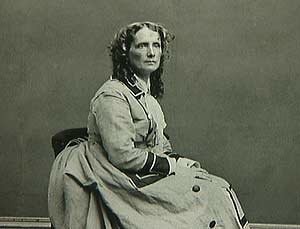
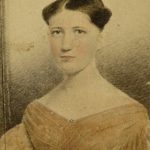
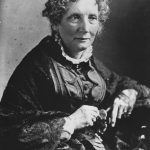

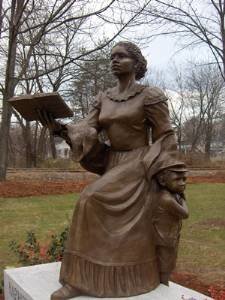
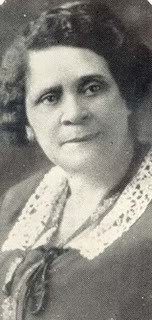
I am related to Victoria claphein woodhull she is my 3 time great Aunt.